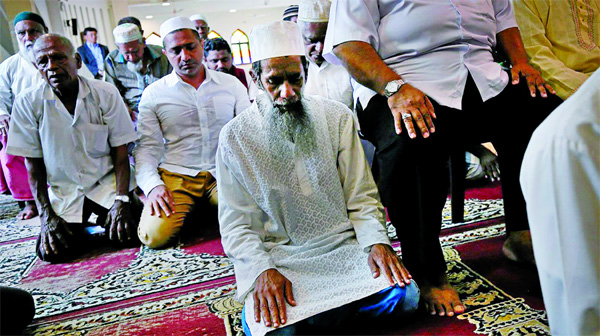
Reuters, Colombo :
As the Islamic call to prayer echoed through the subdued streets of Sri Lanka’s capital Colombo, crowds of Muslims were greeted with an unusual sight: their golden-domed Mosque flanked by soldiers armed with assault rifles.
Security has ballooned in the seaside capital since a series of coordinated suicide attacks at hotels and churches on Easter Sunday killed 253 people and sent shockwaves through an island state that had enjoyed a decade of relative peace.
Nearly 10,000 soldiers were deployed across the Indian Ocean island state to carry out searches and provide security for religious centers.
Fears of retaliatory sectarian violence have already caused Muslim communities to flee their homes amid bomb scares, lockdowns and security sweeps.
But at the Kollupitiya Jumma Masjid mosque, tucked in between sleepy side streets, hundreds defied government calls to stay at home, attending a service they say was focused on a call for people of all religions to help return peace to Sri Lanka.
“It’s a very sad situation,” said 28-year-old sales worker Raees Ulhaq, as soldiers hurried on dawdling worshippers and sniffer dogs nosed their way through pot-holed lanes.
“We work with Christians, Buddhists, Hindus. It has been a threat for all of
us because of what these few people have done to this beautiful country.”
Sunday’s bombings shattered the relative calm that has existed in Buddhist-majority Sri Lanka since a civil war against mostly Hindu ethnic Tamil separatists ended 10 years ago.
Sri Lanka’s 22 million people include minority Christians, Muslims and Hindus.
Muslims and Christians have largely lived peacefully side-by-side, immune from much of the tension that exists between the religious groups in many parts of the world.
Most Sri Lankans are praying that the church blasts five days ago will not open up irreversible rifts.
“Not all Muslims are terrorists,” Abdul Waheed Mohamed, a 43-year-old engineer, said after leaving Friday prayers. “Every day since this carnage happened, me, my family, and all, we are praying to God, please bring us peace.”
As the Islamic call to prayer echoed through the subdued streets of Sri Lanka’s capital Colombo, crowds of Muslims were greeted with an unusual sight: their golden-domed Mosque flanked by soldiers armed with assault rifles.
Security has ballooned in the seaside capital since a series of coordinated suicide attacks at hotels and churches on Easter Sunday killed 253 people and sent shockwaves through an island state that had enjoyed a decade of relative peace.
Nearly 10,000 soldiers were deployed across the Indian Ocean island state to carry out searches and provide security for religious centers.
Fears of retaliatory sectarian violence have already caused Muslim communities to flee their homes amid bomb scares, lockdowns and security sweeps.
But at the Kollupitiya Jumma Masjid mosque, tucked in between sleepy side streets, hundreds defied government calls to stay at home, attending a service they say was focused on a call for people of all religions to help return peace to Sri Lanka.
“It’s a very sad situation,” said 28-year-old sales worker Raees Ulhaq, as soldiers hurried on dawdling worshippers and sniffer dogs nosed their way through pot-holed lanes.
“We work with Christians, Buddhists, Hindus. It has been a threat for all of
us because of what these few people have done to this beautiful country.”
Sunday’s bombings shattered the relative calm that has existed in Buddhist-majority Sri Lanka since a civil war against mostly Hindu ethnic Tamil separatists ended 10 years ago.
Sri Lanka’s 22 million people include minority Christians, Muslims and Hindus.
Muslims and Christians have largely lived peacefully side-by-side, immune from much of the tension that exists between the religious groups in many parts of the world.
Most Sri Lankans are praying that the church blasts five days ago will not open up irreversible rifts.
“Not all Muslims are terrorists,” Abdul Waheed Mohamed, a 43-year-old engineer, said after leaving Friday prayers. “Every day since this carnage happened, me, my family, and all, we are praying to God, please bring us peace.”

